A lot of people were not happy with my post about my 2021 reading journey. While they appreciated that I had done a phenomenal job by reading 131 books, they were disappointed that I had not made the task easy for them, but not sharing the top 10 books. So this post is to address that specific issue.
Seeking Wisdom – by Peter Bevelin
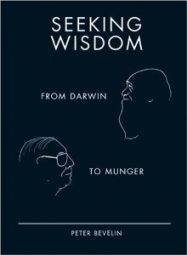
This book will be in my top 10 for LIFE. The way the book is structured, to include all the ‘essential’ elements when it comes to seeking ‘wisdom’ is exemplary. Probably the most expensive book I have ever bought, one gets every penny’s worth of wisdom and much much more from this classic.
Peter Bevelin begins his fascinating book with Confucius’ great wisdom: “A man who has committed a mistake and doesn’t correct it, is committing another mistake.” Seeking Wisdom is the result of Bevelin’s learning about attaining wisdom. His quest for wisdom originated partly from making mistakes himself and observing those of others but also from the philosophy of super-investor and Berkshire Hathaway Vice Chairman Charles Munger. A man whose simplicity and clarity of thought was unequal to anything Bevelin had seen.
In addition to naturalist Charles Darwin and Munger, Bevelin cites an encyclopedic range of thinkers: from first-century BCE Roman poet Publius Terentius to Mark Twainfrom Albert Einstein to Richard Feynmanfrom 16th Century French essayist Michel de Montaigne to Berkshire Hathaway Chairman Warren Buffett. In the book, he describes ideas and research findings from many different fields.
This book is for those who love the constant search for knowledge. It is in the spirit of Charles Munger, who says, “All I want to know is where I’m going to die so I’ll never go there.” There are roads that lead to unhappiness. An understanding of how and why we can “die” should help us avoid them. We can’t eliminate mistakes, but we can prevent those that can really hurt us.
Using exemplars of clear thinking and attained wisdom, Bevelin focuses on how our thoughts are influenced, why we make misjudgments and tools to improve our thinking. Bevelin tackles such eternal questions as: Why do we behave like we do? What do we want out of life? What interferes with our goals?
It is among one of ‘re-reads’ where I open any page and just start reading from there, and have my ‘aha’ moment.
Read and study this wonderful multidisciplinary exploration of wisdom. It may change the way you think and act in business and in life.
Some Quotes from the book:
“Consider how hard it is to change yourself and you’ll understand what little chance you have in trying to change others”
“Wall Street never changes. The pockets change, the suckers change, the stocks change, but Wall Street never changes because human nature never changes”
“You have to go to bed wiser than you got up. As you try to master what you are trying to do – people who do that almost never fail utterly. Very few have ever failed with that approach. You may rise slowly, but you are sure to rise.”
“Trying to change our habits demands effort and effort takes energy – which is a cost. And our brains constantly look for ways to save effort. Furthermore, a change creates an uncomfortable feeling so naturally we try to avoid this feeling by not changing, That’s why we take the easy way, favor shortcuts, and default options and stick to our habits. And the more emotional a decision is or the more choices we have, the more we prefer the status quo”
“A wise man sees as much as he ought, not as much as he can. (Montaigne)”
“The greatest sign of an ill-regulated mind is to believe things because you wish them to be so.”
Running On Empty – Marshall Ulrich
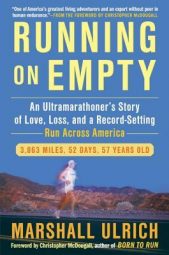
I read quite of books on running, which is my other major passion after reading. And all have been selective and great books. The reason I choose to include Ulrich’s book in the top 10 was for the fab description of how Ulrich has described every moment, every feeling of his running journey. As an ultramarathon runner, Marshall Ulrich has run more than one hundred foot races averaging over one hundred miles each, completed twelve expedition-length adventure races, and ascended the seven summits– including Mount Everest.
The most engaging journey was his run from California to New York–the equivalent of running two marathons and a 10k every day for nearly two months straight–proved to be his most challenging effort yet. Many of you would even find it hard to fathom or imagine a running saga of this sorts.
Ulrich describes in detail, backstory of his run and the excruciating pain he endured in the run. Ulrich also reaches back nearly thirty years to when the death of his first wife drove him to run from his pain.
Ulrich’s memoir imbues an incredible read and should even appeal to non-runners: face the toughest challenges, overcome debilitating setbacks, and find deep fulfilment in something greater than achievement.
“Keep going, one foot in front of the other, millions of times. Face forward and take the next step. Don’t flinch when the road or gets rough, you fall down, you miss a turn, or the bridge you planned to cross has collapsed. Do what you say you’ll do, and don’t let anything or anyone stop you. Deal with the obstacles as they come. Move on. Keep going, no matter what, one foot in front of the other, millions of times.”
The End of Life Book Club – by Will Schwalbe
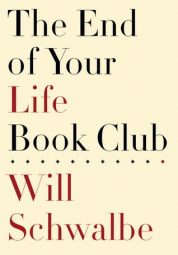
This was one of the most apt inclusion in the top 10, considering my passion of reading. There can be nothing more satisfying than to read a book about books. Where, when moving from page to page, one gradually discovers many more awesome books one can add to our TBR (To Be Read) list. The whole setting of this book is so unique, where a son and his dying mother, who form a “book club” gets them closer as her life comes to ending. This one appealed to me a lot more as I could so well identify it with the passion that I shared with my late father for reading and books.
Mary Anne Schwalbe is waiting for her chemotherapy treatments when Will casually asks her what she’s reading. The conversation they have grows into tradition: soon they are reading the same books so they can have something to talk about in the hospital waiting room. The ones they choose range from classic to popular, from fantastic to spiritual, and we hear their passion for reading and their love for each other in their intimate and searching discussions.
A profoundly moving testament to the power of love between a child and parent, and how much impact reading has on our lives.
“Of course you could do more – you can always do more, and you should do more – but still, the important things is to do what you can, whenever you can. You just do your best, and that’s all you can do. Too many people use the excuse that they don’t think they can do enough, so they decide they don’t have to to do anything. There’s never a good excuse for not doing anything – even if it’s just to sign something, or send a small contribution, or invite a newly settled refugee family over for Thanksgiving.”
“What are you reading? isn’t a simple question when asked with genuine curiosity; it’s really a way of asking, Who are you now and who are you becoming?”
Almanack of Naval Ravikant by Eric Jorgenson
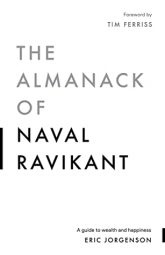
Naval is one of the smartest and yet to most underwhelming and down-to-earth Investors/Entrepreneur/Philosopher in Sillicon Valley. The founder of Angel List is a voracious reader and more than the reading, his ability to articulate his thoughts and express them makes this almanack, beautifully crafted by Eric from his diary notes and twitter feeds, a lifelong learning book.
Getting rich is not just about luck; happiness is not just a trait we are born with. These aspirations may seem out of reach, but building wealth and being happy are skills we can learn.
So what are these skills, and how do we learn them? What are the principles that should guide our efforts? What does progress really look like?
His principles for building wealth and creating long-term happiness have caught the attention of millions of people. This isn’t a how-to book, or a step-by-step gimmick. Instead, through Naval’s own words, you will learn how to walk your own unique path toward a happier, wealthier life.
“Desire is a contract that you make with yourself to be unhappy until you get what you want.”
― Naval Ravikant“A fit body, a calm mind, a house full of love. These things cannot be bought — they must be earned.”
― Naval Ravikant“I would say that the five most important skills are of course, reading, writing, arithmetic, and then as you’re adding in, persuasion, which is talking. And then finally, I would add computer programming just because it’s an applied form of arithmetic that just gets you so much leverage for free in any domain that you operate in.
If you’re good with computers, if you’re good at basic mathematics, if you’re good at writing, if you’re good at speaking, and if you like reading, you’re set for life.”
― Naval Ravikant
Art of Possibility – by Rosamund Stone Zander, Benjamin Zander
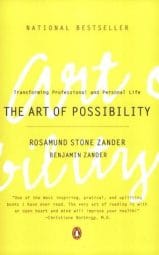
This was an interesting book in the way it is written. The writers have mixed their own learnings and experiences with what their own beliefs to present an interesting perspective of life, which is based on the art of possibility.
Presenting breakthrough practices for bringing creativity into all human endeavors, The Art of Possibility is the dynamic product of an extraordinary partnership. Benjamin Zander’s experience as conductor of the Boston Philharmonic and his talent as a teacher and communicator with psychotherapist Rosamund Stone Zander’s genius for designing innovative paradigms for personal and professional fulfillment make an interesting concoction of knowledge and learning .
The authors’ harmoniously interwoven perspectives provide a deep sense of the powerful role that the notion of possibility can play in every aspect of life.
“In the measurement world, you set a goal and strive for it. In the universe of possibility, you set the context and let life unfold.”
“Every problem, every dilemma, every dead end we find ourselves facing in life, only appears unsolvable inside a particular frame or point of view. Enlarge the box, or create another frame around the data, and problems vanish, while new opportunities appear.”
Art of Living by Thich Naht Hanh
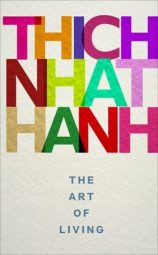
Deeply moving and highly evolved thoughts of the Vietnamese Zen Master from one of the world’s most revered spiritual leaders.
In this book, Thich Nhat Hanh, shares seven transformative meditations that open up new perspectives on our lives, our relationships and our interconnectedness with the world around us. He reveals an art of living in mindfulness that helps us answer life’s deepest questions, experience the happiness and freedom we desire and face ageing and dying with curiosity and joy instead of fear.
Stimulating and inspiring, this book teaches us the importance of looking inside ourselves and developing compassion, before we can turn to our relationships at home and in the wider world. Full of remarkable stories from Thich Nhat Hanh’s own experiences and mindful practices for engaging with life, this will be a book that will help us generate happiness, understanding and love so we can live deeply in each moment of our life, right where we are.
“Whether this moment is happy or not depends on you. It’s you who makes the moment happy, not the moment that makes you happy. With mindfulness, concentration, and insight, any moment can become a happy moment.”
“Aimlessness does not mean doing nothing. It means not putting something in front of you to chase after. When we remove the objects of our craving and desires, we discover that happiness and freedom are available to us right here in the present moment.”
“If we continue to hold on to a dream for something in the future, we lose the present moment. And if we lose the present, we lose everything.”
Book of Life by J Krishnamurthy
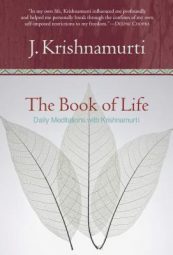
It took me a long time to read this book. Not because it was a difficult read, but because many of J Krishnamurthy’s thoughts evoke more thoughts on the applicability of wisdom in them. Very simple read, in the sense, there are 365 daily meditations on freedom, personal transformation, living fully that one can literally read 1 day at a time and repeat it every year. Of course, I read it in much lesser time, but will try and refer to the book as a ‘re-read’ as a constant source of learning. Written by the man whom the Dalai Lama described as “one of the greatest thinkers of the age, this is surely one of the ‘must read’ books.
“The ability to observe without evaluating is the highest form of intelligence.”
“One is never afraid of the unknown; one is afraid of the known coming to an end.”
“Freedom and love go together. Love is not a reaction. If I love you because you love me, that is mere trade, a thing to be bought in the market; it is not love. To love is not to ask anything in return, not even to feel that you are giving something- and it is only such love that can know freedom.”
“If you begin to understand what you are without trying to change it, then what you are undergoes a transformation.”
Poor Charlie’s Almanack- by Charles T Munger
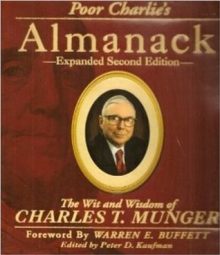
So this was the second almanack of the year and what a book it was!!
Charles T Munger, or popularly known as Charlie is the No.2 man in Berkshire Hathway – long time friend, partner and close confidante of Warren Buffet. Media shy, quiet and reticent, he prefers to work in Buffet’s shadows, but he is as famous for his wit and wisdom (as reflected in many of his speeches that are shared in the book), as for his astute investment skills. While he has made billions of dollars through this investment calls, it his is wit and wisdom that is so well reflected in this book.
Written in a casual format, the book is long but extremely thought provoking and a must read for people who appreciate wealth of wisdom.
“Spend each day trying to be a little wiser than you were when you woke up. Day by day, and at the end of the day-if you live long enough-like most people, you will get out of life what you deserve.”
“In my whole life, I have known no wise people (over a broad subject matter area) who didn’t read all the time — none, zero. You’d be amazed at how much Warren reads–and at how much I read. My children laugh at me. They think I’m a book with a couple of legs sticking out.”
“Acquire worldly wisdom and adjust your behavior accordingly. If your new behavior gives you a little temporary unpopularity with your peer group…then to hell with them.”
“There is no better teacher than history in determining the future… There are answers worth billions of dollars in 30$ history book.”
“It’s not the bad ideas that do you in, it’s the good ideas. And you may say, ‘That can’t be so. That’s paradoxical. What he [Graham] meant was that if a thing is a bad idea, it’s hard to overdo. But where there is a good idea with a core of essential and important truth, you can’t ignore it. And then it’s so easy to overdo it. So the good ideas are a wonderful way to suffer terribly if you overdo them”
Countdown 1945 by Chris Wallace
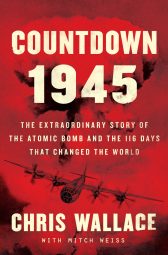
What a fab fab fab book on such a difficult topic!
From Chris Wallace, the veteran journalist and anchor of Fox News Sunday, comes an electrifying behind-the-scenes account of the secret meetings and events across the globe during the 116 days leading up to the world’s first use of the atomic bomb in wartime—the American attack on Hiroshima on August 6, 1945. Published in 2020, it’s amazing how, through painstaking research, getting the minutest of details and writing it an easy to read format, Chris has given a great description on what all happened leading up to one of the most horrific war incidences in history.
Looking back, it’s easy to be critical of the event 76 years ago, and criticise US and have sympathy for the Japanese. But without factoring in the arrogance of the Japanese military and the government and the kind of atrocities they had committed upto that point and how the world was facing continued death and destruction in WW2, which all came to a halt immediately after the bombing, the story would be incomplete.
Must read .
Effortless by Greg Mckeown
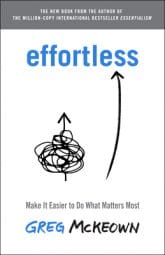
I love Greg McKeown. After Essentialism, this is the second book I have read of his.
Is there a goal you want to make progress on, if only you had the energy? Do you assume that anything worth doing must take tremendous effort? Have you ever abandoned a hard but important activity for an easy but trivial one? Are you often overwhelmed by the complexity that’s expanding everywhere?
If you answered “yes” to any of these questions, you might be making life much harder for yourself than it needs to be.
I Just cannot admire him for the phenomenal book he has written.
He had my attention right from when he shared the example of how to fit in many big stones in a jar, with each stone representing important tasks we need to do.. then onto about how we make tasks difficult by calling it ‘hard daya work’, etc.
In Effortless, McKeown offers proven strategies for making the most important activities the easiest ones. For example:
– Streamline your process by mapping out the minimum number of steps.
– Prevent problems later by solving them before they happen.
– Let Go of perfectionism by finding the “courage to be rubbish.”
– Accelerate your learning by leveraging the best of what others know.
Reading the book, was just effortless.
“Whether it’s “miles per day” or “words per day” or “hours per day,” there are few better ways to achieve effortless pace than to set an upper bound.”
“When you focus on what you lack, you lose what you have. When you focus on what you have, you get what you lack.”
“There is no such thing as an effortless relationship. But there are ways we can make it easier to keep a relationship strong. We don’t need to agree with the other person on everything. But we do need to be present with them, to really notice them, to give them our full attention—maybe not always, but as frequently as we can.”
Whew, that has been one of the most satisfying and full-filling blogs of my life. The wealth of wisdom packed in these lines is amazing, what I have had to leave out is what is mindblowing. Trust me when I say this, it’s hard to imagine anyone reading this books and not having that ‘aha’ moment of realisation on what you had been missing so far.
And oh yeah, thanks to suggestion from Sandeep, we have now created an OS Book club. We plan to share authentic book reviews (meaning people who read a book, write their own review and share in the group) and have book reading sessions. In case you would like to join, please click here: OS Book Club
Happy Reading !!!

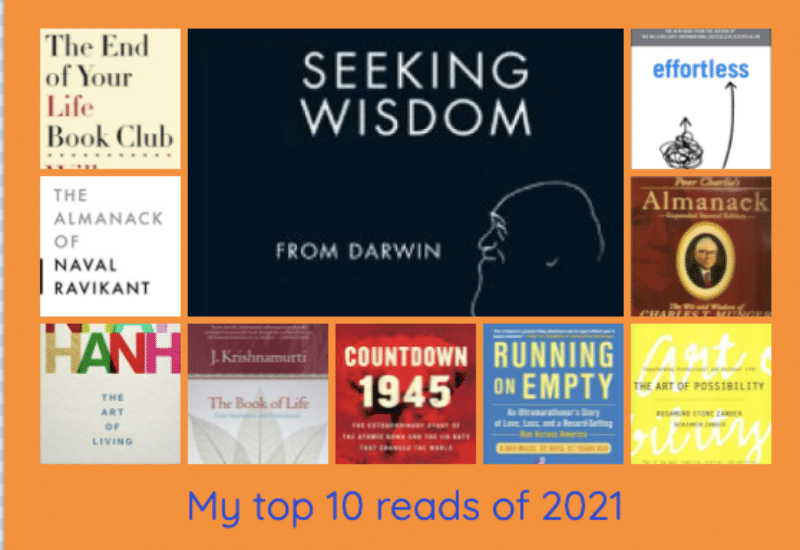







Comments & Discussion
28 COMMENTS
Please login to read members' comments and participate in the discussion.